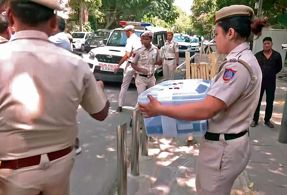
LAGGING: Online consumers in India should not lose out while other countries move ahead rapidly to protect their citizens. ISTOCK
Sushma Ramachandran
Senior Financial Journalist
THE need to regulate the e-commerce giants has been worrying policymakers over the past few years. These concerns have covered a wide range and there seems to be little consensus either within the country or even globally on the way in which Big Tech in the marketplace needs to be reined in. No wonder then that a draft e-commerce policy is still being discussed in a raft of ministries nearly four years after it was finalised. The Consumer Affairs Ministry, the Department of Industrial Promotion and the Ministry for Electronics and Information Technology are apparently still confabulating over the final shape of the policy, with the Niti Aayog having also given its views.
At the domestic level, an e-commerce policy must be evolved that covers issues relating to data privacy, unfair trade practices as well as misleading advertisements.
Meanwhile, the World Trade Organisation (WTO) is holding its own set of protracted plurilateral negotiations on e-commerce over the past three years, with India having abstained from the process. ‘Plurilateral’ talks means that only a subset of members will be discussing the issue rather than the entire membership. Currently, 87 countries are taking part in the e-commerce initiative. This country has now decided to wade into the issue, though it had earlier argued that the discussions were tilting towards the developed countries’ viewpoint. An official statement has been issued seeking deeper discussions before any decisions are taken that could be binding on all WTO members.
There are significant differences between the global and national policy approaches but data protection and privacy are critical in both of them. The domestic policy proposals drafted in 2019 had termed data as a strategic national asset and sought that the algorithms behind e-commerce websites be made available to the government. In the case of the WTO talks as well, India has warned that any move to build a global e-commerce regime could lead to huge revenue and data loss. It has also sought data localisation and technology transfer that has been consistently resisted by developed economies.
While these prolonged discussions are going on at the national and multilateral levels, some countries have already taken the lead with firm measures to restrict unethical practices such as mining of personal data. Last July, the European Union adopted the Digital Markets Act to curb the market dominance of Big Tech with violations punishable with fines up to 10 per cent of a company’s global sales. In addition, the EU laid down the General Data Protection Regulation in 2018. Companies must now ask for consent when they collect personal information and may no longer use data from several sources to profile people against their will.
For the ordinary person who has a smartphone, the data privacy issue seems to be a distant concern. But it comes closer to home when one finds that a great deal of personal information is driving the apps and advertising on everyone’s device. The phone will repeatedly provide information and advertising linked to products that have either been purchased or even browsed. It will send links inviting travel to locations one has visited or is planning to visit or even those being suggested by friends and relatives. One is often advised mysteriously to leave early for the airport to catch a scheduled flight. The reason this magic takes place is that all apps not only collate the data available to them about their user but pass on this information to other apps. So, the marketing of goods and services is done not just by the apps being used but thousands of others that the device owner has no idea about.
The EU regulations no longer allow this facility without seeking the consent of the concerned person. Amazon was fined 746 million euros in 2021 for flouting this rule by Luxembourg.
There are no such curbs as yet in India, though some provisions in the draft e-commerce policy have been incorporated by the Consumer Affairs Ministry in its Consumer Protection (E-commerce rules) of 2020. The rules now include safeguards ensuring that e-commerce marketplaces are responsible for the quality of goods sold on their platforms. They also need to have robust grievance redressal mechanisms. The most controversial provision, however, is the one preventing them from offering market-distorting deep discounts. The aim has apparently been to mollify brick-and-mortar retail traders who are not able to match the heavy discounts on online marketplaces. But it needs to be modified, given the fact that it militates against the interests of consumers who have rarely been given a voice in government policies
The rules are, however, bringing some succour to consumers complaining about unfair trade practices by online players. The Central Consumer Protection Agency (CCPA) has reported a 30 to 40 per cent rise in complaints. The fines so far imposed on the e-commerce players are a drop in the ocean — Rs 78 lakh — for making false declarations on their websites. It is a start but there is still little recourse for a consumer seeking to take on the giants like Amazon, Flipkart, Snapdeal or Paytm Mall. Horror stories abound of unworkable or fake products being sent to buyers who are simply told that the e-commerce platform has no responsibility to provide compensation. In other words, the old tradition of ‘caveat emptor’ or ‘purchaser beware’ prevails even in the modern era of online retail.
There had been hope that online retail policies of returning or exchanging goods would ensure a better track record than physical retail about taking responsibility for defective products. This has clearly not happened till now, judging by complaints of consumers on social media platforms.
It is now incumbent on the government to move much more quickly to protect consumers’ interests as far as e-commerce is concerned both on the national and global stage. At the domestic level, an e-commerce policy must be evolved that covers issues relating to data privacy, unfair trade practices, unsafe goods and services as well as misleading advertisements. At the global level, India must engage on multilateral platforms to ensure that interests of emerging economies are taken into account while finalising long-term policies. These are not issues to be delayed any further. Otherwise online consumers here will lose out while other countries move ahead rapidly to protect their own citizens.
Join Whatsapp Channel of The Tribune for latest updates.




























